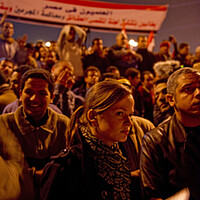Under fire in Gaza, and not a drop to drink
Loading...
| Gaza City, Gaza Strip
Hassan Amoudi hasn't taken a shower in eight days.
On the ground floor of his home, dozens of empty plastic bottles cover the floor, waiting to be filled. On Tuesday, water began trickling from the tap for the first time in 25 days. But because there was no electricity, he couldn't pump it up to his apartment or to the water tank on his roof, only siphon what he could into the plastic bottles before the tap ran dry again.
Even before the latest conflict with Israel, Gaza's water situation was precarious. Now it's a full-bore crisis: an estimated 1.2 million of Gaza's 1.7 million people have little or no access to water or sanitation services. Raw sewage spews into streets after Israeli aerial attacks on waste treatment infrastructure, posing serious public health risks.
However this conflict ends, Gaza faces a huge challenge to rebuild its battered infrastructure, much of it paid for by international donors. Right now, water is perhaps the most acute need, along with power. A group of human rights groups yesterday wrote to Israeli's defense minister calling on him to ensure that humanitarian needs in Gaza are met.
“This conflict is hitting the water and power system in a very vulnerable state,” says Sari Bashi, a founder of Israeli human rights organization Gisha, one of the signatures of the letter. “This needs to stop. Israel needs to provide protection for the humanitarian infrastructure as it wages its military operation.”
Even before the conflict, 95 percent of the water in the aquifer beneath Gaza was undrinkable because of seawater contamination. The water that flows from Gaza's taps – when it does flow – is salty. And because electric pumps are used to distribute the water, and fuel is scarce, water shortages are common.
Treatment of waste water is also woefully inadequate: About 80 million liters of untreated sewage is pumped into the Mediterranean Sea every day. The shoddy water treatment system is a direct result of the blockade by Israel and Egypt on materials such as cement and iron pipes needed for maintenance and expansion.
Repairs on hold
Nearly three weeks of Israeli strikes on water and electricity infrastructure have severely worsened the situation. Monther Shoblak, director of the Coastal Municipalities Water Utility (CMWU), which is supported by foreign donors, says airstrikes have hit wells, water and sewage lines, pump stations, and a sewage treatment plant. Three workers have died in air strikes, forcing a suspension of repairs and maintenance because of the danger.
Mr. Shoblak says he has attempted to coordinate with Israel safe passage for his workers to complete critical repairs, with limited success. Israel has the exact coordinates of all CMWU facilities, he says. Some repairs have been completed under Red Cross escort and with Israeli coordination.
Most areas in Gaza now have water only every three days, and only then for several hours, says Shoblak. Some areas have no water. Electricity is also scarce, and because distributing the water requires electricity, if the water comes and there is no electricity, it is essentially useless.
Electricity infrastructure has also been damaged by Israeli airstrikes – eight of the ten power lines bringing electricity from Israel have been disabled. Early Tuesday, Gaza's only power plant was hit by tank shelling and is out of action. Residents rarely get more than four hours of electricity a day.
In northern Gaza, an airstrike left one pipe carrying waste from Jabaliya refugee camp to a waste treatment plant in the city of Beit Lahiya spewing 20 million liters of raw sewage a day near a housing development. With the water system contaminated, and crew unable to repair the damage, residents have been told not to turn on their taps.
A spokesman for the Israeli Defense Forces said the IDF has been executing "targeted strikes" during the conflict and tries to avoid harming civilians. "As a rule, the IDF attempts to avoid harming civilian infrastructure. The specific case in question is currently under investigation," said the spokesman. He added that workers attempting to perform maintenance can coordinate with Israel to do so.
Pressure on water supplies
Many residents buy water from vendors to use for cooking and drinking, but Shoblak says most such water is not hygienic. As more Palestinians flee the fighting and take refuge with friends and family, pressure on water supplies in residential buildings has spiked. The United Nations Relief and Works Agency is trucking water to the more than 140,000 people taking refuge in its shelters.
For many in Gaza, finding water for their families has become almost a full time job. “We and our neighbors are living to talk about water and power,” says Amoudi. “We wake up dreaming about water and power.”
Between his family and his son's family, who also lives in the building, Amoudi must provide water for 15 people. “We have ten children. They want to eat, drink, and shower,” he says. Their eating habits have also changed because they cannot use the refrigerator without electricity. “Everything you buy, you have to cook the same day,” he says.





